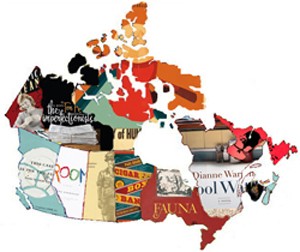Hello there and welcome to my blog!
First order of business, I would like to introduce myself! My name is Caitlyn Robson and I am a 4th year BA student with a combined major in Art History, Visual Culture and English. This is one of my last classes at UBCO before I graduate in May and I am pleased to be focusing on Canadian literature in my final semester. After I graduate from UBCO I will be going back to Alberta to live with my family and work while I wait to hear back from UVic, UofC, and SFX regarding acceptance into the Elementary Education programs they offer. Throughout my journey over the past four years, I have taken many English classes jumping through various genres and eras. However, the only Canadian literature class I have ever taken was when I was in my second year of college prior to coming to UBCO. I find Canadian literature extremely important and thoroughly enjoying! Reading material derived from the beautiful country I was born and raised in is really rewarding and informative.

After reading the syllabus and viewing the introductory vlog I have understood English 470A to be “a scholarly study of Canadian literature in a historical context with a focus on the intersections and departures between European and Indigenous traditions of literature and orature” (Paterson). We will be studying and examining the power and logistics of storytelling within Canada. Through reading various literary texts and articles, students enrolled in this course will understand which stories are heard, which are not and why.
The syllabus Course Description for this class reminded me of two TED Talks I recently watched on youtube regarding the power of storytelling. The first one is Chimanda Ngozi Adichie’s TED Talk “The Danger of a Single Story”. In this, Adichie explains that cultures are composed of many stories and that if a person is only exposed to one single story about a particular culture or individual, their idea of this culture or individual can be extremely misconstrued. I thought it was an informative and relevant video, so if you have time, check it out!
The second TED Talk I recently watched is given by Christ Turner entitled “Why Canadian history isn’t as boring as you think”. In this talk, he explains that Canadians have always understood their historical tale to be a nice but boring and discusses the how this stereotype came to be engrained through storytelling. Again, you should probably watch this as it is actually extremely interesting and I believe to be relevant to this class.
Anyways, I hope you guys enjoyed the TED Talks and thank you for visiting my blog! I look forward reading all of yours and working with you all this semester.
Cait 🙂
Hello Caitlyn,
Welcome to our course of studies, I am looking forward to a great semester – thanks for the TedTalk links.
Cait,
Thank you very much for your post – I really enjoyed reading it, and learning more about your background and aspirations (good luck, btw, on your E.E. applications!). All the media you chose to feature is incredibly relevant and thoughtful, and I especially love the map of Canada/book cover mash-up!
The two videos that you featured on your blog definitely gave me some food for thought regarding power and (as well as of) stories. I find the arguments presented by Adichie and Turner to be compelling, yet I found Chris Turner’s talk to be a tad problematic.
I am a geography major, and have only taken one other Literature class previously (GRSJ 224: Gender, Race, Sexuality and Social Justice in Literature), which may colour my analysis of Turner’s talk a bit. While I understand where Mr. Turner is coming from in trying to rehabilitate the Canadian image, I wonder whether he is missing the mark. Is it necessarily something to strive for to have a compelling, all encompassing national myth – a Canadian version of what Turner terms the ‘Great Frontier’ myth-making machine of the Americans. Is the national myth not just another ‘single story’, whose dangers Adichie warns against?
I know Ted speakers do not have a lot of time to present, and Turner may just be using the mountie figure to succinctly illustrate a larger point. I can’t help but feel a little rankled of his wanting to reclaim the mountie, and recast him as the hero, instead of reexamining other characters of focus.
Cheers,
Merriam
Hi Cait. I really enjoyed reading your first blog! I thought both TED Talks were very relevant to this class. I especially liked “the Danger of a Single Story”. I think Chimanda Ngozi Adichie spoke of common problem people tend to have about only listening to a single story of a nation or of a specific group of people. I think this is particularly relevant to Canada’s history. Edward Chamberlin points out in “If this is your Land Where are your Stories?” we listen only to one story: the settlers story. It is easier to justify the settlers story if we ignore the story of Canada’s First Nations people and this is what we do.
Adichie says at the end of her talk that “when we reject the single story, when we realize there is no single story for any kind of place we regain a kind of paradise”. I think this is very similar to Chamberlin’s opinions on the importance of different stories and how we can begin to reconcile our conflicting stories by accepting them as truth and not truth. I think that these writers ideas have many similarities and are a great place to start looking for information about the importance of multiple stories in Canada’s history but also for country’s around the world.
Thanks for sharing! 🙂